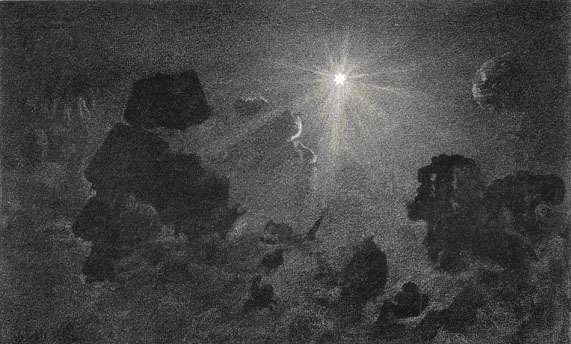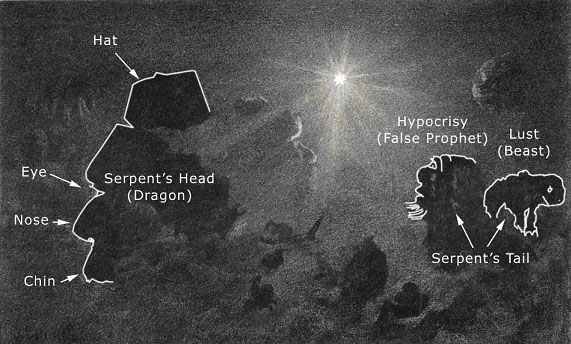| Home | Listen to this article | Return to Articles |
|
Frog Venom Denounced |
|
Chapter sixteen of Saint John's Revelation presents the dire effects of leaning on a material staff. Although the pictures are scary with unclean spirits spewing enticing venom, it is only our stubborn resistance to the truth that makes the scene necessary. "And the sixth angel poured out his vial upon the great river Euphrates; and the water thereof was dried up, that the way of the kings of the east might be prepared. And I saw three unclean spirits like frogs come out of the mouth of the dragon, and out of the mouth of the beast, and out of the mouth of the false prophet. For they are the spirits of devils, working miracles, which go forth unto the kings of the earth and of the whole world, to gather them to the battle of that great day of God Almighty" (Rev 16:12-14). According to Genesis 2, Euphrates was the fourth and final river to flow out from Eden; therefore, it contained all the ingredients of humanity's original home and defined its boundaries. Drying up Euphrates removes man's sanguine hope of ever finding his way back to Eden and a state of finite bliss. The kings of the east are committed to work their magic, allowing their secret and peculiar treasures to be exposed and denounced. Unlike the three wise men of the East, who were willing to offer up their treasures for the true Messiah, these kings are not submitting. They are about to battle the day of God Almighty and to use their incantations to deceive the kings of the earth and of the whole world. These unclean magi cannot destroy man because they have no such power, so they attempt to lure him with distractions to keep him from searching for his inheritance as a child of God. Frogs are like Satan in that they do not exhibit any conscience at all. They will consume anything they can get in their mouths, including each other. Metaphorically, unclean spirits like frogs may refer to toad venom, which contains several poisons that have some nasty effects: two are psychedelic; one creates an erratic heart beat; one destroys heart tissue; one is adrenaline that increases heart rate and the fight or flight response of a sympathetic nervous system; one is a stress hormone; and one is serotonin that affects the gut (digestion), mood, appetite, sleep, muscle contraction, memory, learning, and blood clotting. This venom is seen coming out of the mouths of the dragon, the beast, and the false prophet. We recognize these three. "The great red dragon symbolizes a lie, - the belief that substance, life, and intelligence can be material" (SH 563:8). "The Revelator sees that old serpent, whose name is devil or evil, holding untiring watch, that he may bite the heel of truth and seemingly impede the offspring of the spiritual idea, which is prolific in health, holiness, and immortality" (SH 563:18). The serpent's head stands for distraction - anything that would draw us away from the voice of God. This suggests the law of opposites. For example, if I accept the concept of infinity, then I must also declare a zero or nothing. If I accept the idea of good, then there must be a bad. Wondering about these opposites and trying to make sense of them is the perennial suggestion of the serpent, but to have opposites is not God's nature. Good is never absent and, therefore, is forever unopposed. There is neither choice nor choosing when all is One and one is all, like unto itself. Regardless of whether a satanic thought is pleasurable or painful, it is erroneous since it is not God thinking us as Mind and manifestation. When we accept or indulge in a power other than good, the villainous effects of the serpent's tail - the beast and the false prophet - have ready ingress into our experience. The beast is the material body and physical sense, which has no power of its own but must be moved by another source. The false prophet is the evil that animates the beast. Its song is, 'I can do it all by myself. I can think with my brain. I can feel with my senses. I can even look right at God and deny his presence because I can do what I want and decide for myself.' The serpent's tail is where lust and hypocrisy play out the dream of a mortal's mind opposed to Christ. Here, in accordance with one's thoughts, it is possible to love as lust, to think and miss the mark, to accumulate vast quantities of material wealth and have nothing of value, and to be happy and content sometimes but miserable and sick at other times. By perverse dissuasion, the beast and the false prophet will try every known tactic to block the conscious realization of our true being. The dragon, the beast, and the false prophet
are figured in the first plate of Mary Baker Eddy's book Christ
and Christmas to illustrate the grotesque nature of encumbered
mortal consciousness.   These figures are outlined in white to
make them easier to identify. The figure of a man's head on the
left side of the picture represents the serpent's head. It is
black, signifying depravity: "evil beliefs, passions and
appetites, fear, depraved will, On the right side of the page are two figures that illustrate the serpent's tail - the immediate effect of being distracted by the serpent's head. Lust is on the far right in the form of a beast; hypocrisy is beside it, represented as a man's depraved face looking directly at the star but receiving no enlightenment. He is pontificating on all the evidence of the personal senses, which are flawed and, therefore, not scientific. When we first peck a hole in our shells and see the "first faint morning beams" of truth, why does the dragon appear at the same moment in an attempt to steal away our joy? It is because we resist perfection and are doubtful of ever achieving it. This is the war in heaven (human consciousness) that magnifies itself until human wants become so obviously wrong that we give up the unclean spirits coming out of the mouth of the dragon. Then the clouds of distraction disappear, and sin and hypocrisy are forgotten. "Thou art right, immortal Shakespeare, great poet of humanity: Sweet are the uses of adversity; Trials teach mortals not to lean on a material staff, - a broken reed, which pierces the heart" (SH 66:1). Eventually, the weapons used by evil collapse upon themselves, and man walks free of those burdens. Euphrates, defined spiritually, is the
Comforter - the omniscience of man and the universe. The primal
currents of Truth and Love that cannot be dried up are Christ
and the Comforter - divine Science. The sixth angel is drying
up our conception of humanity so that God's conception of man
as image and likeness will be the only option available. This
divine sense of Euphrates represents the original and final solution,
the open passage that brings knowledge of salvation to humanity,
thus drawing us back home - to Spirit. George Denninger |
| Home | Listen to this article | Return to Articles |
|